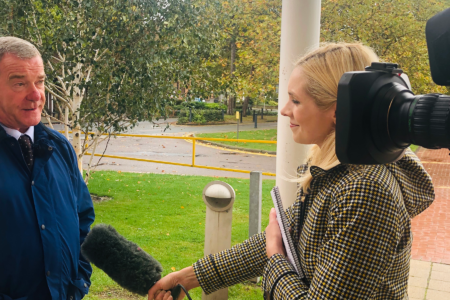Blog
Post Title
Musculoskeletal (MSK) conditions such as osteoarthritis and chronic low back pain affect over 18 million people across the UK. These conditions can cause pain and functional limitations, as well as impact on our mental health, which can make ordinary, everyday activities a struggle and prevent us from being able to work or remain independent. Sally Irwin, a Project Manager for the Joint Pain Advice service in the Health Innovation Network, considers the benefits of simple self-management strategies, such as being active, in preventing and managing what can be a life-changing condition.
People often have the view that they can’t do much about the symptoms of osteoarthritis and chronic low back pain. However, there are tools and techniques that people can use to help manage pain and reduce the impact that these conditions can have, and resources available on how to do this. Keeping moving, a healthy lifestyle and self-management strategies such as learning how to pace yourself by planning and prioritising activities are all helpful.
Those with osteoarthritis and chronic back pain often worry being active will increase their pain and may cause more damage. Conversely, keeping moving can help to manage pain, improve mobility and strengthen muscles and bones. Remaining active can bring many benefits, but we know that putting this into practice and changing our habits and behaviours is not easy. It takes time and effort to do and maintain.
Unfortunately, the current Covid -19 pandemic means many people have less opportunity to be active and socialise as they spend more time at home. Similarly, changes to work environments, such as working from home, may be affecting MSK health.
Many MSK organisations have provided useful web-based information and support, including helplines, online groups and peer support. But for some, all of this information can be overwhelming. It can be difficult to know where to start, how to navigate the options available and how to make them relevant to their lives and what matters to them.
One option to support individuals experiencing hip or knee osteoarthritis or chronic low back pain is Joint Pain Advice (JPA). JPA is a service that provides people with an opportunity to have a conversation about their experience and how it impacts them, as well as relevant self-management options.
The Joint Pain Advice (JPA) model of care was developed by the Health Innovation Network as a result of an identified need for accessible, personalised and understandable information, and practical advice and support about how to self-manage the impact of chronic knee and hip pain (often labelled osteoarthritis) and chronic low back pain.
JPA supports individuals to understand and better self-manage their chronic knee and hip and low back pain.
It puts the National Institute for Health and Care Excellence (NICE) guidelines for the management of osteoarthritis and low back pain into practice, using education and self-management strategies for a patient-centred, holistic approach and focusing on increased physical activity and managing weight where appropriate.
The model can easily be incorporated into existing services with minimal disruption and adapted to local contexts. Its flexibility means it can be delivered by a wide range of healthcare and non-healthcare professionals, and it sits comfortably within community, clinical and workplace settings.
The HIN co-ordinates and delivers training for professionals wanting to deliver Joint Pain Advice, which is offered nationally but with a focus on south London. This evaluation shows improvements in pain, physical function, physical activity and mental wellbeing through JPA. Whilst this is based on face-to-face appointments, the approach can easily be delivered virtually where this is not possible.
JPA is a simple and effective way to support individuals experiencing knee and hip osteoarthritis and chronic low back pain to manage the impact that the condition can have on their lives.
If you are interested in finding out more information about Joint Pain Advice, please email hin.jointpainadvice@nhs.net. The JPA training is delivered free of charge to south London organisations.
Sally Irwin is a Project Manager for the Joint Pain Advice service in the Health Innovation Network.

